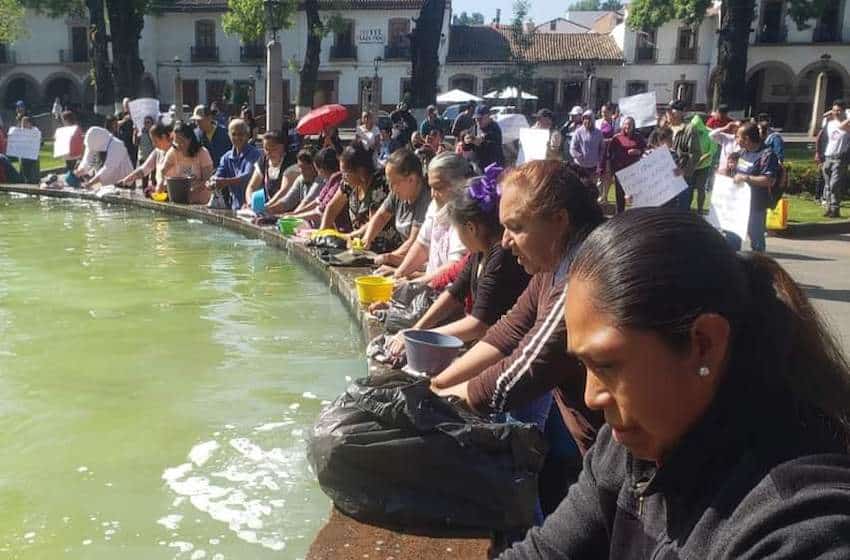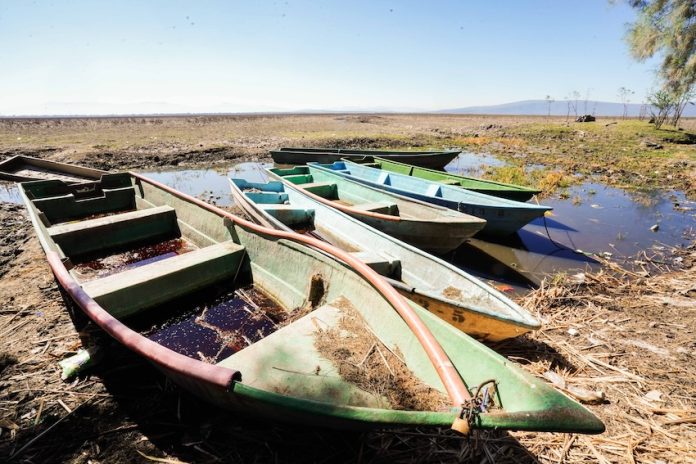Lake Cuitzeo, the second largest freshwater lake in Mexico, is facing a dire situation after reportedly having lost a staggering 70% of its water over the past two and a half decades.
The alarming decrease is attributed to a combination of factors, primarily three consecutive years of low rainfall, 2023 having been particularly critical. Deforestation in the surrounding area of Michoacán, largely to make way for avocado groves and strawberry fields, has disrupted the natural water cycle, exacerbating the problem.

Octavio Muñoz Torres, deputy operational director of the National Water Authority (Conagua) in the state of Michoacán, emphasized that deforestation for agriculture has altered rainfall patterns.
Being a closed basin, the 306-square-kilometer lake reflects the ecological imbalance in the hills, where aquifer layers should recharge. Additionally, intentional burning of tule, an aquatic plant, has affected the lake’s center, reducing its capacity.
The impact is profound, affecting upwards of 1,000 fishermen who represent 75% of the area’s population. The lake’s drying has forced hundreds of them to seek alternative livelihoods, such as masonry in the state capital of Morelia or the neighboring state of Guanajuato.
The loss of depth in the lake has reduced the population of fish (and other ecosystem-significant organisms) such as charales — tiny fish that are fried and eaten like french fries — leading to a significant economic downturn for those who catch it and sell it.
Local authorities and environmentalists are warning that urgent action is required. If the extraction of water and the often illegal expansion of avocado crops are not curtailed, Lake Cuitzeo faces a grim future, officials have said. Municipal and state representatives agree that without intervention, the lake is headed toward extinction.
Meanwhile, in nearby Pátzcuaro, Michoacán, residents are resorting to unusual protest methods due to a year-long water shortage.
On Sunday, residents of several neighborhoods gathered in the expansive Plaza Vasco de Quiroga and washed clothing in the fountain to draw attention to the crisis.
According to figures from Mexico’s Drought Monitor, published every two weeks by the National Meteorological Service (SMN), 46.1% of Michoacán is experiencing drought conditions rated as “extreme,” 22% as “severe,” 6.5% as “moderate” and 24.3% as “abnormally dry.” Only 1.1% of the state is considered to be “not affected” by the lack of rain.

This is also affecting nearby Lake Pátzcuaro, where those who work in the fishing sector have begun migrating out of the area to seek employment in neighboring Jalisco or even as far away as Baja California.
Mayor Julio Alberto Arreola Vázquez noted that “fishing activity has decreased by up to 50% in the last 10 years” and that the lake has lost “at least 30% of its water level” in recent years.
He said that experts are seeking to “reactivate” 126-square-kilometer Lake Pátzcuaro by artificially cultivating its endemic species, such as whitefish, acúmara fish and achoque — the latter of which is a salamander that can be made into cough syrup.
Mexico’s largest freshwater lake, and one of the largest in North America, is Lake Chapala in Jalisco. Covering an area of approximately 1,100 square kilometers, it was featured in a 2023 report about 20 famous lakes that are going dry.
With reports from El Sol de México, El Sol de Zamora and La Jornada
